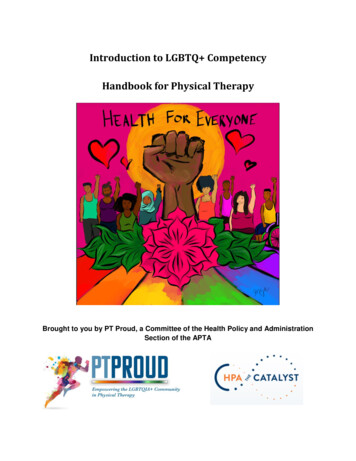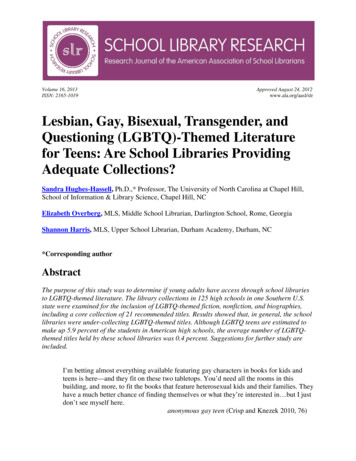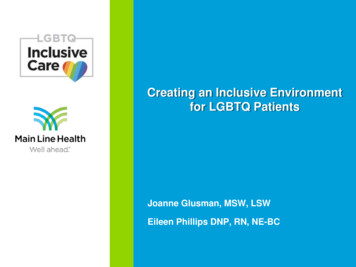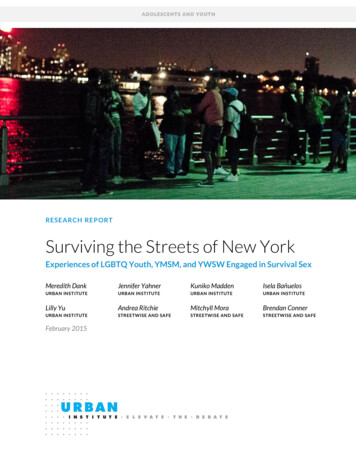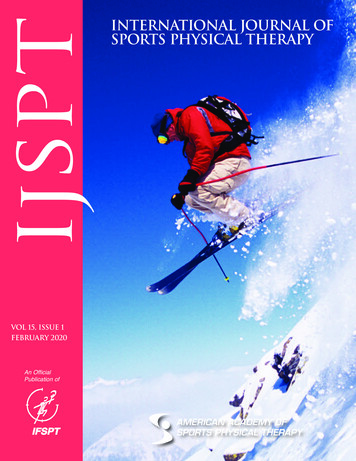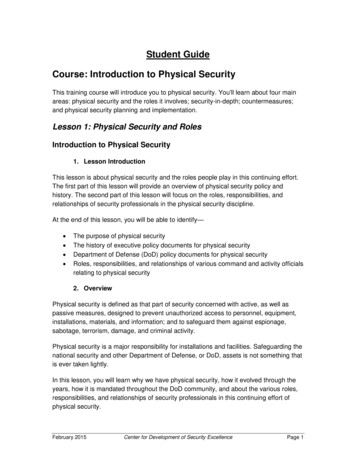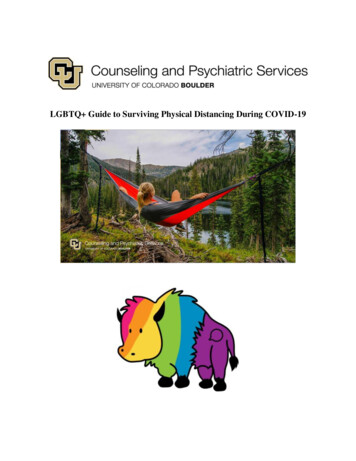
Transcription
LGBTQ Guide to Surviving Physical Distancing During COVID-19
In Solidarity,We know that the abrupt changes related to COVID-19 and theuniversity’s transition to remote learning have been difficult for a lot ofstudents. We also know everyone’s circumstances are different. Some ofyou may have a lot of support right now, and some of you may bestruggling to find support or may not be feeling safe in your livingenvironment. You may be feeling a lot of different emotions or havingmixed reactions to online learning formats or stay at home orders. Youmay feel an array of emotions being with/without your family of originor being away from chosen family.Even though physical distancing can feel isolating, it is a form ofsolidarity. We are all getting through this together and taking care of oneanother by physically distancing. But we can still connect with eachother in lots of other ways. We hope this guide can provide you withresources, support, validation, and belonging.“Caring for myself is not self-indulgence, it is selfpreservation”-Audre Lorde2
CU Boulder ResourcesWe’re Open and We’re Here for You!Counseling and Psychiatric Services (CAPS)At CAPS, we have a staff of specialized mental health providers with experienceaddressing the specific needs of our LGBTQ students. Our counselors are trained inproviding confidential and personalized care, including letters of support and otherdocumentation required for transition including hormone therapy and surgery. CAPS alsooffers a Transgender and Gender Creative therapy group for CU students. DuringCOVID-19, CAPS is open and providing individual and group therapy, walkinappointments, and psychiatric follow up visits via telehealth to students who are currentlyin state. CAPS is also providing workshops, eLet’s Talks, and mental health managementservices that are available to students both in and outside of Colorado.Office of Victim Assistance (OVA)OVA provides free and confidential support, advocacy, and short-term counseling tostudents who have experienced a traumatic, disturbing or life disruptive event. OVA isskilled at working with LGBTQ-specific needs. We recognize that individuals may be inunsafe living situations during stay at home orders and therefore may be especially inneed of OVA supports right now. During COVID-19, OVA is open and providingservices over the phone and online.Medical ServicesMedical Services provides comprehensive, informed and inclusive care for our LGBTQ students, including starting and continuing hormone replacement therapy. DuringCOVID-19, Medical Services is open for in-person and telehealth visits.Additional CU websites and resources CU Boulder Pride Office Center for Inclusion and Social Change CU Transgender Care Resources CU students impacted by COVID-19 and seeking financial assistance can apply forthe Student Emergency Fund.3
Additional LGBTQ ResourcesOut Boulder CountyOut Boulder County specializes in educating, advocating and providing services,programs, and support for Boulder County’s Lesbian, Gay, Bisexual, Transgender,and Queer communities. They provide a website with updates about their currentservices and virtual support groups.The Center on ColfaxThe Center on Colfax is a safe and welcoming place for Colorado's proud, diverseLGBTQ community. They provide a website with COVID-19 related resources.Queer AsteriskQueer Asterisk is a Colorado nonprofit organization providing queer-informedcounseling services, educational trainings, and community programming. Theyalso accept some insurances for counseling services.CLEARIn order to help the LGBTQ community navigate the COVID-19 pandemic, theCenter for LGBTQ Evidence-based Applied Research COVID-19 Resources andInformation (CLEAR) team created the following list of national LGBTQ-specificCOVID-19 resources.TrevorSpaceTrevorSpace is an affirming international community for LGBTQ young peopleages 13-24. Sign up and start a conversation now.Susan’s PlaceSusan’s Place includes resources, news, chats, and forums for TGNC individuals.Rescqu NetRESCQU NET provides you closet-friendly access to nonprofit resources,anonymous online communities, and LGBT education, for closeted, stealth,questioning, and under-resourced people.4
TransPulse Transgender ResourcesTransPulse offers a sense of community and kinship for transgender folks, theirfamilies, their friends, and their allies. In our forums, you will find a friendlycommunity with a wealth of knowledge and experience at its fingertips. Much thesame, our live chat offers experience and moderators who are trained in suicideprevention.Validation StationValidation Station is a new free service is sending daily text validations totransgender people who are under lockdown during the coronavirus pandemic.Guidelines for chest binding amid COVID-195
Domestic Violence/Intimate Partner ViolenceWe know that some students may not be feeling safe where they are living. Thiscould be due to not being out to other members in the home, or their identities notbeing accepted by other members in the home. We also know individuals could beexperiencing emotional, mental, physical, or sexual violence in their livingsituations, and stay at home orders may make it feel even harder seek help orsupport. Please know, even though we are physically distancing, it is okay andencouraged to seek immediate support and stay somewhere else. This could bewith a friend, other family, or a shelter. Below are some resources. Also remember,CU Office of Victim Assistance and Counseling and Psychiatric Services are alsoavailable to support you. National Domestic Violence Hotline 24/7 Hotline: 1-800-799-7233 (SAFE) Staying Safe During COVID-19 Safehouse Progressive Alliance for Nonviolence (SPAN) 24/7 Hotline: 303-444-2424 SPAN COVID-19 Resources Colorado Coalition Against Domestic Violence Moving to End Sexual Assault (MESA) 24/7 Hotline: 303-443-73006
Let’s Talk about StressWhat is it?Stress is a normal reaction to the pressures of life. This includes school,work, family, financial responsibilities, etc. When we experience stress,the body releases the stress hormone, ‘cortisol’. Normal stress tends tosubside once the situation has passed.How does chronic stress differ from stress?Chronic Stress is the response to emotional pressure suffered for aprolonged period of time (i.e., a continuous release of cortisol), in whichan individual perceives they have little or no control (such as: Covid-19,hurricanes, trauma, or dangerous environments).How might this impact me?Prolonged exposure to stress can lead to increased health relatedconditions such as psychological distress, physical disorders, and canaffect our overall sense of well-being. Minority groups and communitiestend to experience an increase in ‘minority stress’ due to increasedexposure to social pressures, prejudice or discrimination which canincrease symptoms of stress.What can I do about it?While there may be a lot of factors influencing the level of stress youexperience, there are ways to reduce stress. Creating a self-care/stressmanagement plan can provide relief from the tension and pressuresgoing on.This page is reprinted with permission from Florida Gulf Coast University, Counseling andPsychological Services, Surviving Covid-19: LGBTQ resource guide for making it through socialdistancing; created by Catherine Tallant, PsyD and Dennis Christoffersen, PsyD.7
What Can I Control?Step 1: Focus on what you do have control overDuring difficult times, it can be hard to maintain a sense of perspectiveand control over our environment. Begin to regain your strength bynoticing the aspects you can influence.Step 2: Create a self-care/work routineCreating a routine whether it’s work, academic, or self-care can help youfeel in control of your day as well as maintain your overall well-being.Step 3: Practice mindfulness and compassionPracticing mindfulness and compassion for yourself and others can helpyou stay connected to the moment, feel in control over your experiencesand emotions, as well as ease anxiety symptoms.Step 4: Utilize your resources to connectUse what you have to your benefit. In a time of social isolation it canfeel as though options are limited. Reach out, connect, or make spaceand time to take care of yourself by utilizing your resources.This page is reprinted with permission from Florida Gulf Coast University, Counseling andPsychological Services, Surviving Covid-19: LGBTQ resource guide for making it through socialdistancing; created by Catherine Tallant, PsyD and Dennis Christoffersen, PsyD.8
What is Self-Care?Self-care is any activity that we do deliberately in order to take care ofour mental, emotional, and physical health.How do we do self-care?1. Be intentional: Needs to be something you plan, not an accident orby coincidence.2. Stick to the basics: Create a routine and find your own rhythm.Rules for self-care It is not something that we force ourselves to do, or something wedon’t enjoy doing. “Something that refuels us, rather than takes fromus.” -Agnes Wainman Self-care isn’t selfish. It is not only about considering our needs; it is rather about knowingwhat we need to do in order to take care of ourselves, beingsubsequently, able to take care of others as well. Good self-care is key to improved mood and reduced anxiety. It’salso key to a good relationship with oneself and others.This page is reprinted with permission from Florida Gulf Coast University, Counseling andPsychological Services, Surviving Covid-19: LGBTQ resource guide for making it through socialdistancing; created by Catherine Tallant, PsyD and Dennis Christoffersen, PsyD.9
The 5 Pillars of Mental HealthOne way you can start improving your mental and physicalhealth is through a self-care plan that accounts for these crucialaspects:1. Sleep: Aim for 8-10 hours of sleep Keep a bedtime and wake time Stick to a bedtime routine2. Eating: Quality and Quantity is key Consistent schedule, consider meal prepping or cooking at home.3. Exercise: When we exercise the ‘happy hormone’ Endorphins are released Positive emotion is associated with 55-70% of our max, or about 110-140BPM for 18-22 year olds 20-30 minutes can rapidly affect our mood4. Hydration: Aim for 70-80 ounces a day, if you are thirsty you’re already gettingdehydrated5. Social Support: Connect with other people, talk about your experiencesThis page is reprinted with permission from Florida Gulf Coast University, Counseling andPsychological Services, Surviving Covid-19: LGBTQ resource guide for making it through socialdistancing; created by Catherine Tallant, PsyD and Dennis Christoffersen, PsyD.10
Tips for Coping with Physical DistancingFocus on what you can control. Engage in basic hygiene and prevent further spread of thevirus. Wash your hands for 30 seconds with soap & water, stay 6 feet away from others, onlywear a mask if you are sick, & clean frequently used surfaces in your home.Moderate. Try to slow down your media and news intake to not feel overwhelmed. It’s helpfulto have a balance of staying informed while also engaging in self-care through offline activities.Get the facts. Be sure to listen to reliable and credible sources such as WHO, CDC, CODepartment of Public Health & Environment, and CU Boulder. Pick 1-3 reliable sources for yournews/information/updates to be sure not to flood or overwhelm yourself.Stay connected with others. Set-up phone dates, have group hangouts with Skype, Zoom, orFaceTime, host a Netflix Party with friends, write letters to friends.Take care of your body. Hydrate, get 8 hours of sleep, choose nutritious foods to fuel yourbody, stretch, engage in exercises you can do indoors.Change your perspective. Instead of viewing this as forced confinement, is there a way toreframe the situation? What are things you have been wanting/needing to do? How can you usethis time to feed your soul, check in with yourself, reassess your values?Ground. If you’re feeling overwhelmed or anxious, try a grounding exercise, such as naming 54-3-2-1. Name 5 things you can see, 4 things you can feel, 3 things you can hear, 2 things youcan smell, and 1 thing you can taste. See Calm’s video for guidance. Headspace, Calm, InsightTimerKnow that it’s OK to not be OK. Anxiety and stress are normal reactions to this situation andyou are not alone.Write it down. Journaling can be a powerful way to release emotions and thoughts you arefeeling stuck on. Check out Calm for free journals and prompts.Practice gratitude. It can be helpful to write down the things you feel gratitude for or things thatare going well in your life.Give back. Donate money or supplies if you are able, order delivery to support local restaurants,buy gift cards to local businesses to use at a later date.Be kind to others. Reach out to loved ones you haven’t talked to recently. Express your care andinterest in how others are coping. Offer help to others when or if you can in a safe manner (keepin mind social distancing).11
Staying on Track with AcademicsRemember You’re not simply taking online classes.You’re at home during a crisis,trying to learn remotely. Create a routine & “workspace” if possible Change out of your pajamas Retain your regular sleep schedule Set work hours Make to-do lists 10-15 minutes before class to get into “work” mode Treat your remote classes as if they were in-person Turn off phone/internet browsing during classes Attend class/do work from somewhere that is not your bed, ifpossible (if not possible, make your bed and be on top of yourcovers, and try turning yourself 90 degrees so you’re sitting on adifferent part of your bed from where you sleep) Short blocks of study time without interruption Give yourself breaks during the work day Stay in communication with professors Virtual study groups Headphones (roommates/shared spaces)12
Helpful Articles about Staying on Track Academically:CU Boulder Today How to Stay Motivated with Remote LearningCU Boulder Staying on Track in Virtual ClassesAmherst College Student Strategies for Learning RemotelyStevenson University Tips for Student Success - Remote LearningHelpful CU Boulder Websites for Academics/Career Assistance:Withdraw and Pass/Fail (April 30 deadline)Academic AdvisingWriting Center Virtual AppointmentsRemote Tutoring OptionsRemote Learning Guidance for Students (OIT)Career Services Virtual VisitsCollegiate Recovery Center Meetings & Virtual SupportISSS Remote AdvisingVolunteer Resource Center Opportunities13
My Daily Peace of Mind Plan (POMP)Rationale: Consistently following a daily routine of taking simple (but not always easy!)action self-care steps can help us: Remain OK despite what may be going on around us. “Inoculates” against stresseffects! Become less dependent on people, places and things to “get it right so we can feelalright.” Experience increased freedom to move about our day as we would like with less“wear and tear;” not getting so easily bogged down by fear, anger, frustration ordisappointment.Core components / principles: Staying in the present (versus the future or the past) Focusing on things that ARE in my control today & relevant actions I CAN take. Reducing self-focus; increasing sense of connection to something larger thanourselves (whatever works for you: spiritual, religious, nature, the Cosmos, humanity,etc.). Engage in small anonymous acts of kindness or helpfulness to others 3 X perday and notice the Effects. Initiate contacts with others daily to check in, broadenfocus and get different Perspectives. Avoiding traps like overthinking, future projection, dwelling on the past or things outof my control, defensiveness, argument and fault-finding that DRAIN my mental andphysical resources and foster a negative, self-defeating attitude in self (and others). Our ATTITUDE determines our direction. We tend to find what we are looking for. H.A.L.T.: Watch and avoid becoming too Hungry, Angry, Lonely or Tired.o These factors increase vulnerability to symptom flare-ups (irritability, emotionaloverreactivity, panic, low mood, hopelessness, mistaking feelings for facts,potentially setting off a spiral of negativity). 14Our Physical and Mental health are intertwined. Getting enough “fuel” (food intake),hydration and sleep are ESSENTIAL daily self-care action steps that cannot beignored for long without negative impacts on our health and well-being. *For thosewith trouble awakening, you might consider an app that detects sleep level andpermits setting a time range for wake-up alarm to go off when sleep is at lightestlevel. Avoid hitting “snooze.”
TODAY’S POMP* (Day: M T W R F; Date: )Morning (start of day): Establish early enough wake-up time to “seize the day” and reserve 15-30 minutes forself-care in a place affording sufficient privacy. If desired, try a variety of nature sounds audios/videos available on YouTube andelsewhere as a helpful background. Examples: Spring forest with bird sounds Wind chimes Ocean waves Cleansing “Good Morning/Day” breaths: Breathe IN slowly and deeply through the nose into the “belly” (diaphragm) for 4seconds HOLD the breath for 4 seconds noticing and appreciating the fresh air intake Breathe OUT slowly through the mouth for 4 seconds FULLY EXHALING, as ifemptying a balloon, noticing any stress or tension leaving the body with each outbreath HOLD this empty state for 4 seconds (as comfortable) noticing the differencebetween tension and calm Repeat 1 or 2 more times Inspirational quote or brief reading (have fun searching for relevant material you canselect from as desired; consider autobiographies of people you admire and aspire to belike). Meditation/Self-Reflection: Breathing normally and comfortably, imagine your day ahead concentrating on:1. The most ESSENTIAL tasks and responsibilities for the day ahead (“need to dovs. nice to do.”) and,2. Exactly HOW I want to move through the day today (e.g., Resilient and Strong; Open & Flexible; Tranquil and Alert; Helpfuland Compassionate, Experiencing just the right amounts of energy, focus andeffort needed to maintain balance and achieve my goals for today;incorporating as many sensory associations as possible (what does it sound,feel, look like as I picture moving through the day in these desired ways?).3. Imagine how an admired figure (past, present, real or fantasized) wouldapproach and respond as a source of inspiration and guidance.15
[Include Aerobic movement of your choice as able and tolerated within the limits of yourcurrent health and abilities - possible options could include on-line exerciseclasses/workouts, walking, running, swimming, yoga, cycling, martial arts, dance, etc.Use Mindful meditation in noticing and appreciating the strength, flexibility and beautyin how our bodies feel and respond in motion.]Mid-Day Pause & Reflection: Take some time as needed during the day to pause, breathe deeply, meditate andreflect on how the day is going in terms of your responses thus far and anyadjustments that may be needed or desired as you envision moving through the rest ofthe day and respond as you would like. Check on H.A.L.T. and any omitted self-care action steps that need attention. Reach out to others as needed to check in, connect, refocus.End-of-Day Compassionate Self-Review: Pause, breathe and reflect on your self-care action steps today. “What did I do today to maintain my psychological/emotional well-being and health?(Did I pause, reach out to others, complete anonymous good deeds, read, move, eat,etc.?) What did I miss that there is still time remaining in the day to complete? What knowledge/learning can I take away from today to apply to my effortstomorrow? (Constructive self-appraisal to grow, not to tear down, dwell on or becomemorose over; consider writing down/journaling to help notice and recall for the nextday) Inspirational reading, Ted Talk, etc. relevant to the day’s experiences and goals fortomorrow and setting the stage for transition into rest, relaxation and sleep. Check outa variety of available on-line resources to see which ones you find most helpful.This section is reprinted with permission from Florida Gulf Coast University, Counseling andPsychological Services, Surviving Covid-19: LGBTQ resource guide for making it through socialdistancing; created by Catherine Tallant, PsyD and Dennis Christoffersen, PsyD; POMP adapted byDennis Christoffersen, PsyD.16
Free & Low-Cost Resources for Managing COVID-19EXERCISE/MOVEMENT: Down Dog YogaPlanet Fitness (free live-streamed daily workouts)CorePower Yoga (free recorded classes)Zook Dance Fitness (free dance group fitness classes)Fitness Blender (free cardio, strength, & stretch workout videos)Yoga with Adrienne (free YouTube channel for yoga/meditation)Orange Theory Fitness at Home (free 30-minute workouts)Peloton (free 90-day trial, no bike needed; includes HIIT, strength, yoga, & more)Obé (free 30-day trial; join live or on-demand fitness classes)Nike Training Club (185 free workouts for all levels)Impulse Dance & Fitness of Fort Collins (free live stream classes)How to create an exercise routine you'll actually stick toThe best YouTube channels for getting in shape at homeThe best workout apps for people who hate working outOutdoor Activities. Activities outside are still considered safe for those not alreadyexposed to COVID-19 (suggestions from our governor) but keep in mind the socialdistancing rules. Boulder County gave some suggestions here.TECHNOLOGY: Comcast Internet Essentials (free access to Internet for 60 days for low-income families) Xfinity WiFi Hotspots (available to anyone across U.S. for free)o Map of Xfinity WiFi hotspots Zoom Video Conferencing (free Pro account for all CU Boulder students) CU Boulder Technology Resources for Working Remotely Stay in & Sling (offering thousands of free shows/movies)COMMUNITY & GROUPS: Local Supporto Front Range COVID-19 Kindness Circleo Front Range Mutual Aid Networko Boulder COVID-19 Mutual Aid Network Virtual Communityo General: 18percent (free peer-to-peer online support community) 7 Cups (various online communities) Mental Health America (mental health support group & discussioncommunity)17
o For People of Color: Yellow Couch Collective (group chat & community for Black women,free trial and then 10/month) Young People of Color Community Groupo For Substance Use & Recovery: SMART Recovery (forums & online meetings) Alcoholics Annonymous (online meetings) CU Collegiate Recovery Center (offering support online/phone M-F 9-4)o For Chronic Health: The Mighty (“A safe, supportive community for people facing healthchallenges and the people who care for them”)o For Mood Disorders (Anxiety, Depression, Bipolar) Turn2Me Anxiety & Depression Association of America Depression & Bipolar Support Alliance The Tribe Wellness CommunityFOOD RESOURCES: Boulder Food Rescue Hunger Free Colorado Food Bank of the Rockies Colorado Pet Pantry Epicurious: Free Recipes Takeout/Delivery (Takeout & Delivery Discount Codes)o Grubhubo Uber Eatso DoorDasho Postmateso Instacart Black Cat Farm (offering curbside pick-up & delivery for local produce & meals)FINANCIAL SUPPORT: One Fair Wage (assistance for tipped/service workers affected by COVID-19) Restaurant Workers’ Community Foundation (Resources & COVID-19 Crisis ReliefFund for restaurant owners & workers) United States Bartenders Guild: Bartender Emergency Assistance Program Unemployment Benefits (If you’ve been laid off due to COVID-19 you may be eligiblefor benefits from state unemployment insurance fund; NOTE: can take 4-8 weeks toreceive benefits) Colorado Work-Share Program (for employers who need government assistance to keepworkers employed)18
Connecting Colorado (job database)Denver Department of Public Health & Environment List of Support ServicesResources for Local Artists from Colorado Creative IndustriesDenver Cultural Sector Support & Resources (includes local, state, and nationalresources)Health Well Foundation: Support for COVID-19 Ancillary Costs (up to 250 support forCOVID-related telehealth, delivered food, medications, transportation, & diagnostics)FREE ONLINE MENTAL HEALTH RESOURCES: Coronavirus Anxiety Toolkit & Resources Virtual Self-Care Package in Managing COVID-19 Stress Coronavirus Sanity Guide from 10 Percent Happier Free & Low-Cost Online Wellness Led by People of Color, Womxn, & Queer Folks Silver Cloud Online Mental Health Program (free, confidential portal that offers secure,immediate access to online programs for stress, anxiety, and depression) 7 Cups (free connection to community of trained volunteer peer listeners, along with selfguided coping skills & paid professional counseling available as well) Tiny Buddha (resources for various mental health concerns, forums, blog) Calm (blog, meditations, journal, visualization) Greater Good Science Center (science-based resources to support resilience &connection)o Guide to Well-Being During CoronavirusONLINE PROFESSIONAL THERAPY RESOURCES: Ayana Therapy (affordable telehealth for those looking for therapists with similarmarginalized identities to their own) Teladoc (telehealth therapy & psychiatry with licensed providers, in-network with CUGold, all telehealth visits currently covered through June 4 with 0 co-pay) Amwell (telehealth therapy available with licensed providers for 99 or less per visit,accepts some insurances) Talkspace (subscription telehealth therapy with licensed providers for 260-396/month) BetterHelp (subscription telehealth therapy with licensed providers for 160-280/month)VOLUNTEER/DONATE: Help Colorado Now Shopping Angels (run errands for elderly/immuno-compromised) American Red Cross (blood donation) Donate needed supplies to United Way Project Angel Heart prepares and delivers meals for people living with life-threateningillnesses19
CU Boulder Volunteer Resource Center OpportunitiesVIRTUAL ENTERTAINMENT: 50 Things to Do at Home in Colorado in 2020 InWeStay (free 1-month trial to attend virtual events in your city) Netflix Party (free way to watch Netflix with your friends online & host long distancemovie nights and TV watch parties) NFL Games Pass (free through May 31, watch games from 2000-2019) NBA League Pass (free through April 22 to watch classic games or this season’s games) Boulder Arts Week Online (March 27 – April 4) Free entertainment to help you survive coronavirus social distancing Virtual Tours of Museumso The Louvreo National Gallery of Arto Metropolitan Museum of Arto National Museum of Modern and Contemporary Art, Koreao Van Gogh Museumo National Museum of Anthropology, Mexico Cityo British Museum Virtual Trips to Places Around the Worldo Go on a virtual field trip to Ellis Islando Take a live look at Colonial Williamsburgo Tour England through this 360 videoo Explore the Denver Botanic Gardenso Virtually discover Yellowstone National Park and 5 other National Parkso Talk a walk on the Great Wall of Chinao Check out the view from Pompeiio Explore the surface of Mars on the Curiosity Rovero Escape to the Central Artic by joining the MOSAic Expedition virtually Animal Webcamso San Diego Zooo Monterey Bay Aquariumo Smithsonian’s National Zoo & Conservation Biology Instituteo Atlanta’s Zoo Panda Camo Georgia Aquariumo Ouwehand Park Polar Bears Free Coloringo Print off a free printable coloring page from the “Color Our Collections”campaign with coloring sheets from over 100 museums and libraries from aroundthe worldo Choose from over 1,500 coloring pages with Just Color Free Films & Videoso From the 2020 Environmental Film Festivalo From the International Documentary Filmfestival Amsterdam20
o From NASA Free Concerts & Showso Austin City Limits Free Concert Archiveo Seoul Philharmonic Orchestrao Nightly Met Opera Streamso Live Streamed Concerts in DenverFree Bookso Scribd (30-day free trial to unlimited books)o Authoromao Project Gutenburgo LibriVox (audiobooks)o ManyBookso 10 ways to download and read books online for freeo The Guardian: Reader Suggestions to Bring Joy in Difficult TimesPodcastso From the New Yorkero The Guardian: Podcasts to Binge While You’re Socially Distancingo Mashable: Chatty, Cheerful Podcasts to Try if Your Home Feels Too Quieto Time: The 50 Best Podcasts to Listen to Right NowFree Gameso GOG (video games for PC)o Play Games with Friends such as Cards Against Humanity & Checkerso Words with Friendso The Guardian: 25 Best Video Games to Play While You’re Self-Isolating (Somegames are free and others cost, be sure to check).WELLNESS APPS:(Listed apps are free for Apple & Android, and are not affiliated with CAPS programming) Specialized Supporto eMoods Bipolar trackero nOCD toolso Self-Help Anxiety Managemento SoberTool Recoveryo UpliftNow - Grief & Losso RR Eating Disorder Managemento Calm Harm - decrease self harm Stress & Mood Managemento ACT Coach skillso Mindshift CBT toolso Virtual Hope Boxo What's Up coping tools21
o Woebot situation guidance Rest & Relaxationo Breathe2Relaxo CBT-I Coach for insomniao Insight Timer Meditationo Mindfulness Coacho Stop, Breathe, ThinkAcademic Successo Brain Focus – Productivityo MyHomework – Plannero StickK – CommitmentLOCAL CRISIS RESOURCES: CALL:o CU CAPS (303) 492-2277o CU Police: (303) 492-6666 / Emergency 911o National Suicide Prevention Lifeline (24/7): (800) 273-8255 (English); (888) 6289454 (Spanish)o Colorado Crisis Services Line (24/7): (844) 493-8255o Trevor Project (LGBTQ) Crisis Line (24/7): (866) 488-7386 TEXT:o Crisis Text Line (24/7): Text HOME to 741741o Colorado Crisis Service Text Line (24/7): Text TALK to 38255 WALK IN:o Mental Health Partners Walk-In Crisis Center (24/7): 3180 Airport Road,Boulder, CO 80301; (303) 443-8500o Boulder County Community Health Hospital (24/7): 4747 Arapahoe Avenue,Boulder, CO 80303, (303) 415-700022
and time to take care of yourself by utilizing your resources. This page is reprinted with permission from Florida Gulf Coast University, Counseling and Psychological Services, Surviving Covid-19: LGBTQ resource guide for making it through social distancing; created by

